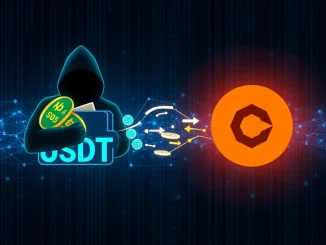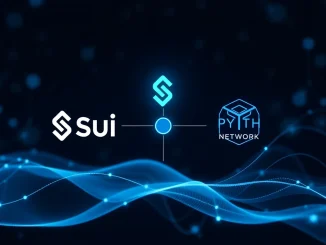
Big news from the U.S. financial regulatory front! The Securities and Exchange Commission (SEC) is hosting a significant event, and you’ll want to pay attention if you’re interested in how digital assets are reshaping finance. The SEC tokenization roundtable, officially titled “Tokenization — Moving Assets Onchain: Where TradFi and DeFi Meet,” is set for May 12th. This isn’t just another meeting; it brings together key players from both traditional finance (TradFi) and the burgeoning world of decentralized finance (DeFi) to discuss a topic poised to revolutionize markets: tokenization.
What is the SEC Tokenization Roundtable All About?
The core purpose of this SEC tokenization roundtable is to delve deep into the implications of tokenizing real-world assets and financial instruments. Tokenization involves converting rights to an asset into a digital token on a blockchain. Think of it like creating a digital share or certificate for anything from real estate and art to stocks and bonds, making it potentially easier to trade, manage, and fractionalize.
The SEC’s interest signals a growing recognition of tokenization’s potential impact on securities markets. The discussion will likely cover:
- The technical mechanics of moving assets onchain.
- Regulatory considerations and challenges.
- Potential benefits for market efficiency and liquidity.
- Risks associated with digital assets and blockchain technology.
- The convergence points and conflicts between existing TradFi structures and emerging DeFi protocols.
Why is Financial Tokenization a Hot Topic Right Now?
Financial tokenization isn’t just a buzzword; it represents a fundamental shift in how assets can be owned, transferred, and managed. Proponents argue it can unlock liquidity for illiquid assets, reduce transaction costs by cutting out intermediaries, and increase transparency through blockchain’s distributed ledger technology.
Consider the potential:
| Aspect | Traditional Finance (TradFi) | Tokenization (Onchain) |
|---|---|---|
| Asset Representation | Physical certificates, database entries | Digital tokens on a blockchain |
| Trading Hours | Limited (e.g., 9-5 weekdays) | Potentially 24/7 |
| Settlement Speed | T+2, T+3 days | Minutes to hours (depending on blockchain) |
| Fractional Ownership | Difficult, often limited to specific instruments | Easier for a wide range of assets |
| Intermediaries | Multiple (brokers, custodians, clearinghouses) | Reduced or eliminated via smart contracts |
This potential efficiency gain is why major financial institutions are exploring or actively building tokenization platforms. The SEC’s roundtable provides a platform for these institutions to share their perspectives and for regulators to better understand the landscape.
Bridging the Gap: Tokenization TradFi DeFi
One of the most fascinating aspects of the upcoming discussion is the focus on where tokenization TradFi DeFi meet. Traditional finance operates within established regulatory frameworks and relies on centralized institutions. Decentralized finance, conversely, aims to remove intermediaries using blockchain, smart contracts, and peer-to-peer networks.
Tokenization acts as a bridge. TradFi firms can use blockchain technology to create digital representations of traditional assets, potentially leveraging some of DeFi’s efficiency while operating within familiar legal structures. Meanwhile, DeFi protocols could potentially gain access to a wider range of high-value, real-world assets once they are tokenized and meet necessary compliance standards.
However, this convergence isn’t without challenges:
- Regulatory clarity: How do existing securities laws apply to tokenized assets and DeFi protocols?
- Interoperability: Can tokenized assets move seamlessly between different blockchains and traditional systems?
- Security risks: Smart contract vulnerabilities and cyber threats remain concerns.
- Market structure: How will tokenization impact existing exchanges, clearing houses, and custodians?
Who Are the Key Players at the SEC Blockchain Discussion?
The list of panelists for this SEC blockchain focused event is impressive and speaks volumes about the significance of the topic. Experts from some of the largest and most influential financial firms are participating, including:
- Fidelity
- Franklin Templeton
- BlackRock
- And others yet to be fully detailed on the public agenda.
These firms represent trillions of dollars in assets under management and have been actively exploring or investing in digital assets and blockchain technology. Their participation indicates that tokenization is a strategic priority for the future of finance, not just a niche concept.
Exploring Digital Asset Tokenization: What to Expect?
For anyone interested in the future of markets, the digital asset tokenization roundtable on May 12th is a must-watch event. It offers a rare glimpse into the regulatory thinking and industry perspectives on this transformative technology.
Expect discussions to touch upon:
- The types of assets most likely to be tokenized first (e.g., real estate, private equity, bonds).
- The infrastructure needed to support a tokenized financial system.
- The role of central bank digital currencies (CBDCs) or stablecoins in facilitating tokenized markets.
- Potential benefits for retail and institutional investors.
The roundtable is open to the public and will be webcast live on the SEC’s official website, making it accessible for everyone to follow the crucial conversations shaping the future of digital assets and finance.
Conclusion
The SEC’s upcoming SEC tokenization roundtable on May 12th is a landmark event. By bringing together giants of TradFi and pioneers in DeFi, the commission is facilitating a vital dialogue about the opportunities and challenges presented by tokenization. This technology has the potential to redefine financial markets, making them more efficient, accessible, and liquid. Keeping an eye on the outcomes of this discussion will be crucial for understanding the regulatory path forward and the speed at which digital asset tokenization will integrate into the global financial system. It’s a pivotal moment where the future of finance is being actively shaped.



